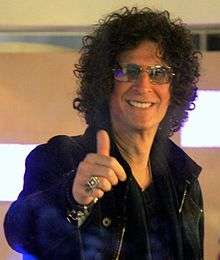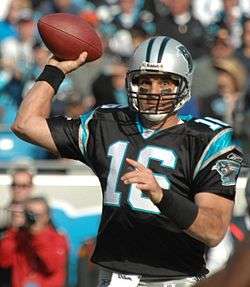Rockville Centre, New York
| Rockville Centre, New York | |
|---|---|
| Village | |
| Incorporated Village of Rockville Centre | |
|
The headquarters of the Diocese of Rockville Centre on Sunrise Highway and North Park Avenue | |
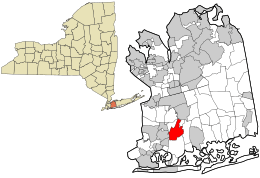 Location in Nassau County and the state of New York. | |
 Location within the state of New York | |
| Coordinates: 40°39′48″N 73°38′13″W / 40.66333°N 73.63694°WCoordinates: 40°39′48″N 73°38′13″W / 40.66333°N 73.63694°W | |
| Country |
|
| State |
|
| County | Nassau |
| Incorporated | 1893[1] |
| Government | |
| • Mayor | Francis X. Murray |
| Area | |
| • Total | 3.4 sq mi (8.7 km2) |
| • Land | 3.3 sq mi (8.5 km2) |
| • Water | 0.1 sq mi (0.2 km2) |
| Elevation | 30 ft (9 m) |
| Population (2010) | |
| • Total | 24,023 |
| • Estimate (2016)[2] | 24,571 |
| • Density | 7,100/sq mi (2,800/km2) |
| Time zone | UTC-5 (Eastern (EST)) |
| • Summer (DST) | UTC-4 (EDT) |
| ZIP codes | 11570 |
| Area code(s) | 516 |
| FIPS code | 36-63264 |
| GNIS feature ID | 2391098 |
| Website |
www |
Rockville Centre is an incorporated village located in Nassau County, New York, in the United States. At the time of the 2010 census, the village had a total population of 24,023. It is in the southwestern section of the Town of Hempstead.
History
Rockville Centre has been occupied by humans for thousands of years. Generally speaking, the people of the prehistoric Woodlands period East River culture are believed to have been the Algonkian-speaking ancestors of the historical Indian tribes of western Long Island.[3] The historical territory of their Lenape descendants, the Canarsie, Recouwacky (Rockaway),[4] Matinecock and Massapequa, included present-day western Long Island's Queens and Nassau Counties.
By the year 1643, there were roughly thirteen Algonquin bands (then referred to as tribes) living east of the Dutch-English settlements: the four or so Lenape chieftaincies in western Long Island, and Metoac descendants of the prehistoric Woodlands period Windsor culture living on eastern Long Island, considered by some to be branches of the Pequot: Merrick, Nissequoge, Secatoag, Seatauket, Patchoag, Poosepatuck (also called Uncachogee), Corchaug, Shinnecock, Manhasset and Montaukett.
Imported diseases had decimated the natives in 16th century. While disease was still a major factor during the decades of the 17th century, native mortality in western Long Island due to disease was similar to that of the settlers. Most Lenape were pushed out of their homeland by expanding European colonies; the colonies received many emigrants while the Munsee-speaking Indian communities did not. Their dire situation was exacerbated by losses from intertribal conflicts.
The Reckouakie tribe (the Reckonhacky chieftaincy) had left their original land in present-day Rockaway and its surroundings in Queens County to Dutch Governor Kieft in 1640 because he wanted it for better defense of New Netherlands.[5] Most settled to the east in what was to become Rockville Centre on the traditional land of the Matinecock (or of the Massapequa), with whom they had ties of kinship. Dutch and English settlers declared the 1639 treaty meant no Indians would remain in western Long Island (so they could sell it to emigrants), in contrast to the exact terms of the treaty which meant the Native Americans were willing to share the usufruct of unoccupied land, with the Dutch leadership having eminent domain superior to their sachem's eminent domain. This led to many conflicts then four years of open warfare. The Reckonhacky / Rockaway were party to a peace treaty dated 24 May 1645 following the devastation of Indian communities by Dutch soldiers.[6][7][8] Violent expropriation dislocated them with the arrival of additional Dutch and English settlers.[9]
The hamlet was named "Rockville Centre" in 1849, after local Methodist preacher and community leader Mordecai "Rock" Smith. It was incorporated as a village in 1893.[10] Rockville Centre emerged in the late nineteenth and early twentieth century as a commuter community connected to New York by the Long Island Rail Road.[11] In 1915, the New York Tribune went so far as to declare that Rockville Centre was a place in which "the average mortal could live happily."[12]
Like many Long Island communities at the time, Rockville Centre's population included a considerable number of supporters of the Ku Klux Klan during the 1920s.[13] When the white supremacist organization placed a wreath at the town's memorial to its war dead in 1923, the American Legion removed it in protest, but the city police received so many calls of complaint in response that they were forced to replace the wreath.[13] In the late 1960s, the village of Rockville Centre received a stinging rebuke for its failure to maintain public housing units primarily inhabited by African-Americans.[14] A report from Nassau County's Human Rights Commission stated Rockville Centre was "at best indifferent to, if not actually in favor of, Negro removal."[14] Martin Luther King Jr. visited Rockville Centre in 1968, where he addressed a large audience at South Side Junior High School on 26 March 1968.[15]
The Rockville Centre Post Office was listed on the National Register of Historic Places in 1989.[16]
Demographics
| Historical population | |||
|---|---|---|---|
| Census | Pop. | %± | |
| 1880 | 1,882 | — | |
| 1900 | 1,884 | — | |
| 1910 | 3,667 | 94.6% | |
| 1920 | 8,262 | 125.3% | |
| 1930 | 13,718 | 66.0% | |
| 1940 | 18,613 | 35.7% | |
| 1950 | 22,362 | 20.1% | |
| 1960 | 26,355 | 17.9% | |
| 1970 | 27,444 | 4.1% | |
| 1980 | 25,412 | −7.4% | |
| 1990 | 24,727 | −2.7% | |
| 2000 | 24,568 | −0.6% | |
| 2010 | 24,023 | −2.2% | |
| Est. 2016 | 24,571 | [2] | 2.3% |
| U.S. Decennial Census[17] | |||
2000 census
At the time of the census[18] of 2000, there were 24,568 people residing in the village, 9,201 households and 6,468 families. The population density is 7,496.5 people per square mile (2,892.0/km2). There are 9,419 housing units at an average density of 2,874.0 per square mile (1,108.7/km2); as of 2004,.[19] The racial makeup of the village is 84.3% White, 9.8% African American, 7.8% Hispanic or Latino of any race, 1.5% Asian, 0.08% Native American, 0.04% Pacific Islander, 3.0% from other races, and 1.03% from two or more races.
There are 9,201 households, of which 33.9% have children under the age of 18 living with them, 59.1% are married couples living together, 9.0% have a female householder with no husband present, and 29.7% are non-families. 26.9% of all households are made up of individuals and 13.7% have someone living alone who is 65 years of age or older. The average household size is 2.64 and the average family size is 3.25. The population is spread out with 25.8% under the age of 18, 5.8% from 18 to 24, 26.2% from 25 to 44, 25.9% from 45 to 64, and 16.3% who are 65 years of age or older. The median age is 40 years. For every 100 women there are 87.9 men. For every 100 women age 18 and over, there are 81.9 men.
According to a 2007 estimate,[20] the median income for a household in the village is $99,299, and the median income for a family is $128,579. Males have a median income of $70,149 versus $43,800 for females. The per capita income for the village is $40,739. 5.0% of the population and 2.8% of families are below the poverty line. Out of the total population, 7.0% of those under the age of 18 and 5.7% of those 65 and older are living below the poverty line.
Geography
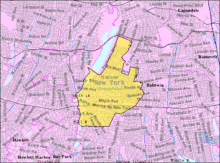
Rockville Centre is located at 40°39'48" North, 73°38'13" West (40.663390, −73.636831).[21] The village has a total area of 3.4 square miles (8.8 km2), of which, 3.3 square miles (8.5 km2) of it is land and 0.1 square miles (0.26 km2) of it is water. The total area is 2.38% water.
2010 census
At the time of the census[22] of 2010, there were 24,111 people residing in the village, 9,201 households and 6,468 families. The population density is 7,496.5 people per square mile (2,892.0/km2). There are 9,419 housing units at an average density of 2,874.0 per square mile (1,108.7/km2); as of 2010,.[23] The racial makeup of the village is 78.3% White, 8.6% Black or African American, 9.7% Hispanic or Latino, 0.1% American Indian and Alaska Native, 2.0% Asian alone, 0.0% Native Hawaiian and Other Pacific Islander, 0.1% Some Other Race, and 1.2% Two or More Races.
There are 10,002 households, of which 32.0% have children under the age of 18 living with them, 56.1% are married couples living together, 9.8% have a female householder with no husband present, and 31.3% are non-families. 27.5% of all households are made up of individuals and 32.7% have someone living alone who is 65 years of age or older. The average household size is 2.64 and the average family size is 3.28. The population is spread out with 25.8% under the age of 18, 5.8% from 18 to 24, 26.2% from 25 to 44, 25.9% from 45 to 64, and 16.3% who are 65 years of age or older. The median age is 40 years. For every 100 women there are 87.9 men. For every 100 women age 18 and over, there are 81.9 men.
Education
Rockville Centre students attend the Rockville Centre U.F.S.D., the Oceanside U.F.S.D.,and Baldwin U.F.S.D.
The Rockville Centre U.F.S.D. has five public elementary schools: The Watson School, The Covert School, The Wilson School, The Hewitt School, and The Riverside School. In addition to the elementary schools, Rockville Centre also consists of South Side Middle School and South Side High School. The district extends beyond Rockville Centre's borders, including part of South Hempstead, and Hempstead. Covert Elementary School is located in South Hempstead. Part of Rockville Centre is located in the Oceanside school district and a part in the Baldwin School District.
According to www.schooldigger.com, South Side High School ranks 116th out of 752 schools in New York State. This is based on actual test scores. , In 2012, South Side High School was ranked #22 by U.S. News & World Report's Best High Schools, and #2 in the state of NY. It has also consistently rated in Newsweek's The Top of the Class: The complete list of the 1,300 top U.S. Schools, #42 in 2008, #44 in 2007, #32 in 2006, #45 in 2005 and #65 in 2003.
Approximately 20 percent of the residents of the Village of Rockville Centre live in the Oceanside Union Free School District. Rockville Centre students attend Oceanside School #2 and Oceanside School #5 as well as the Oceanside Middle School and Oceanside High School and some live in the Baldwin School District attending Plaza Elementary School, Baldwin Middle School, and Baldwin High School in Baldwin, NY[24]
Rockville Centre has one private K-8 Catholic day school; The Saint Agnes Cathedral School. The Saint Agnes Cathedral School occupies a single campus. The Saint Agnes Cathedral School provides a day school education for Kindergarten through Eighth Grade for families across Nassau County. The Saint Agnes Cathedral School's upper school (9–12), though now defunct, shared the complex at one time. The school is widely regarded for their consistently high-rated academic program among Long Island private schools, as well as their diverse secondary school placement.
Notable people
Notable current and former residents of Rockville Centre include:
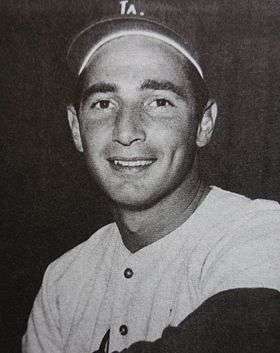
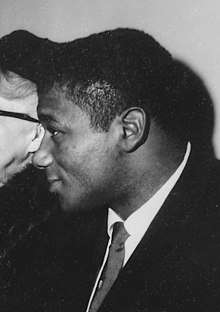
- Eddie Arcaro (1916–1997), jockey who was inducted into the horse racing Hall of Fame.[25]
- Dave Attell (born 1965), comedian.[26]
- Pete Axthelm (1943–1991), sportswriter, columnist and TV commentator.[27]
- Sy Berger (1923–2014), baseball card designer with Topps[28]
- Tommy Bianco (born 1952), third baseman who played for the Milwaukee Brewers.[29]
- John Byner (born 1938), impressionist, comedian and actor.[30]
- John F. Carew (1873–1951), politician who served in the U.S. House of Representatives from 1913–1929.[31]
- Brian Cashman (born 1967), general manager of the New York Yankees.[32]
- Kevin Connors, ESPNNEWS sports anchor.
- Ted Demme (1963–2002), film director and producer.
- Billy Donovan (born 1965), head coach, Oklahoma City Thunder, NBA.
- Crystal Dunn (born 1992), association football forward, U.S. Women's National Team.
- Martin Feldstein (born 1939) Chief of Economic Advisors to Ronald Reagan.
- Joseph Fins (1959–), physician and medical ethicist.
- Bethenny Frankel (1970–), entrepreneur.
- Joel Gallen, television and film director/producer, and president of Tenth Planet Productions.
- Joe Gannascoli, actor, Vito Spatafore on The Sopranos
- Doris Kearns Goodwin, author, historian, TV news analyst, 1995 Pulitzer Prize winner for history.
- Seth Grahame-Smith, writer and film producer.
- Mel Gussow (1933–2005), theater critic for The New York Times.
- Jim Hayes (1948–2009), all-time Boston University basketball scoring average leader.
- Joey Heatherton (1944–), actress and entertainer.
- Ray Heatherton (1909–97), actor.
- Art Heyman (1941–2012), basketball player, All-American at Duke University.
- Henry Hill (1943–2012), mob informant.[33]
- Donald Holder, stage lighting designer.
- Billy Idol (1955–), rock singer.
- Joan Jett (1958–), rock musician.[34]
- Dean Kamen (1951–), Segway Human Transporter inventor.[35]
- Kerry Keating, head coach, Santa Clara University Broncos, former UCLA assistant coach.[36]
- Kevin Kelton (1956–), TV writer-producer, wrote for Saturday Night Live.
- Gilbert King (1962–), author, Pulitzer Prize winner.
- Sandy Koufax (1935–), Baseball Hall of Fame pitcher.
- Frank Layden (1932–), Niagara University coach, president and coach of NBA's Utah Jazz.
- Kenny Laguna, producer, songwriter and musician.
- David Wong Louie (1954-2018), novelist and short-story writer.
- Brian Mahoney (1948–), New York Nets player [ABA]; head coach at Manhattan College and St. John's University.
- Brendan Malone (1942–), assistant coach for Detroit Pistons, former head coach of Toronto Raptors and Cleveland Cavaliers.
- Terry McDermott, baseball player for L.A. Dodgers.
- Anne Meara (1929–2015), actress and comedian, mother of actor Ben Stiller.
- John Nolan and Michelle Nolan of the band Straylight Run.
- Mark O'Connell, drummer of the band Taking Back Sunday, attended South Side High School.
- Daryl Palumbo (1979–), of the bands GlassJaw and Head Automatica.
- Floyd Patterson (1935–2006), boxer, Heavyweight Champion of the World.[37]
- Frank Pellegrino, actor and restaurateur.
- Tommy Rainone (1980–), welterweight boxer.
- June Diane Raphael, actress, comedian, writer.
- Bob Richardson (1928–2005), photographer.
- Tom Riker (1950-), basketball player.
- Joan Roberts, created role of Laurey in original production of Oklahoma! on Broadway.
- Ted Robinson, Emmy Award-winning radio and TV sportscaster.
- Noah Rubin (1996–), tennis player.
- Amy Schumer (1981–), comedian.
- Robert B. Silvers (1929–), editor of The New York Review of Books
- Dean Skelos, former New York State Senator; former New York State Senate Republican Majority Leader.
- Howard Stern (1954–), radio personality.[38]
- Paulette Tavormina, photographer.
- Danielle Elizabeth Tumminio, author, theologian, and religious leader.
- Vinny Testaverde, College Hall of Fame Quarterback, Heisman Trophy Winner, 2 Time NFL All Pro.
- Marc Turnesa, golfer on the PGA Tour.
- Jay Wright (1961–), head coach of Villanova Wildcats basketball team.
- AJ Wynder, basketball player for 1990–91 Boston Celtics.
In popular culture
- The third season episode Long Island, of Dave Attell's television show Insomniac featured several locales in Rockville Centre, including Stinger's Irish Pub, the LIRR station, and the comedian's home.
- Eternal Sunshine of the Spotless Mind (2004), starring Jim Carrey and Kate Winslet. Rockville Centre is mentioned as the home-destination of both Joel Barish (Carrey) and Clementine Kruczynski (Winslet) when the two play hooky from work to visit Montauk.
- Edward Burns has filmed scenes of several of his films in Rockville Centre.
References
- ↑ http://www.queensalive.org/queensalive_history.php
- 1 2 "Population and Housing Unit Estimates". Retrieved June 9, 2017.
- ↑ The Indian Archaeology of Long Island, Garvies Point Museum and Reserve, accessed February 2018.
- ↑ Aboriginal Place Names of New York, Bulletin of the New York State Museum, 1907; page 179; accessed 8 February 2018.
- ↑ Governor Kieft's Personal War, by Walter Giersbach; accessed February 2018.
- ↑ Matinecock Masonic Historical Society: History Archived February 6, 2012, at the Wayback Machine., accessed 8 February 2018
- ↑ Encyclopedia of Massachusetts Indians, by Donald Ricky, Somerset Publishers, Inc., Jan 1, 1998; page 158; accessed 8 February 2018.
- ↑ The Munsee Indians: A History, by Robert S. Grumet, University of Oklahoma Press, 22 October 2014, page 61; accessed 8 February 2018.
- ↑ Rather, John (10 September 2000). "Rockville Centre: A Community Not Easily Pigeonholed". New York Times.
- ↑ "History of Rockville Centre". Village of Rockville Centre. 2014-08-21. Retrieved 2016-04-18.
- ↑ "Rockville Centre a Growing Suburb". New York Times. 14 August 1910.
- ↑ "Rockville Centre a Popular Town". New York Tribune. 18 July 1915.
- 1 2 "Seized Klan Wreath Ordered Replaced". New York Times. 31 May 1923.
- 1 2 Leventhal, Paul and RV Denenberg (15 February 1966). "Rights Panel Report Assails Rockville Centre on Housing". Newsday.
- ↑ Devlin, Marilyn Nunes (2011). A Brief History of Rockville Centre: the Heritage and History of a Village. London: The History Press. p. 101.
- ↑ National Park Service (2009-03-13). "National Register Information System". National Register of Historic Places. National Park Service.
- ↑ "Census of Population and Housing". Census.gov. Archived from the original on May 12, 2015. Retrieved June 4, 2015.
- ↑ "American FactFinder". United States Census Bureau. Archived from the original on September 11, 2013. Retrieved January 31, 2008.
- ↑
- ↑ "Rockville Centre village, New York – Fact Sheet – American FactFinder". Factfinder.census.gov. Retrieved January 24, 2011.
- ↑ "US Gazetteer files: 2010, 2000, and 1990". United States Census Bureau. February 12, 2011. Retrieved April 23, 2011.
- ↑ "Profile of General Population and Housing Characteristics: 2010". Factfinder2.census.gov. Retrieved May 19, 2014.
- ↑ Archived April 27, 2015, at the Wayback Machine.
- ↑ portal (2014-08-21). "Quick Facts about the Village". www.rvcny.us. Retrieved 2017-09-17.
- ↑ Leggett, William. "Bioperse: Top Jockey Eddie Arcaro", Sports Illustrated, June 17, 1957. Accessed January 6, 2017. "Today he lives in his tastefully furnished home in Rockville Centre, on New York's Long Island, together with his wife (the former Ruth Mishkell) and their two children, Carolyn, 15, and Bobby, 13 (see picture above)."
- ↑ Tannenbaum, Rob. "Comedy Schlub; Dave Attell's Insomniac kicks off its fourth season this week. A conversation with TV's funniest fat, bald, booze-loving loner.", New York (magazine). Accessed January 6, 2017. "Raised on Long Island, in Rockville Centre, Attell graduated from NYU in 1987 with a degree in communications, then began performing at open-mike nights, inspired by his comic heroes, Bill Hicks and Sam Kinison."
- ↑ Valk, Garry. "Letter from the Publisher", Sports Illustrated, October 24, 1966. Accessed January 6, 2017. "With Whit Tower still in PAris after his coverage of the Arc de Triomphe, Pete was a natural choice to report the Big A's Champagne Stakes (page 28). He knows Aqueduct well, although his heart still hungers for the verdant Belmont Park (when he was growing up in Rockville Centre, N.Y., he spent a lot of time at Belmont, where he began betting horses at the age of 16)."
- ↑ Goldstein, Richard. "Sy Berger, Who Turned Baseball Heroes Into Brilliant Rectangles, Dies at 91", The New York Times, December 14, 2014. Accessed September 29, 2016. "Sy Berger, who transformed a boys’ hobby into a high-stakes pop culture niche as the father of the modern-day baseball trading card, died on Sunday at his home in Rockville Centre, N.Y., on Long Island."
- ↑ Tommy Bianco, Society for American Baseball Research. Accessed January 6, 2017.
- ↑ Neuhaus, Cable. "Rude, Crude and Outrageous, John Byner's Bizarre Behavior Makes Him Cable's King of Comedy", People (magazine), December 12, 1983. Accessed January 6, 2017. "The chances of discovery were indeed bleak for Byner during his early years. The fifth of six children of Michael and Christina Biener, John does not have warm memories of his upbringing in Rockville Centre on Long Island, N.Y."
- ↑ Staff. "JOHN F. CAREW DIES; RETIRED JURIST, 77; Member of the State Supreme Court l4 Years Presided at Vanderbilt Custody Suit Awarded Child to Aunt Figured in 1915 Row", The New York Times, April 14, 1951. Accessed January 6, 2017. "ROCKVILLE CENTRE, L.I., April 13—Former State Supreme Court Justice John Francis Carew died here last night at his home, 141 South Park Avenue."
- ↑ Botte, Peter. "CASHMAN KNOWS WHO'S THE BOSS" New York Daily News, February 8, 1998. Accessed January 6, 2017. "Brian McGuire Cashman was born on July 3, 1967, in Rockville Centre, L.I."
- ↑ "The Cast Of Characters In The Bc Caper". CNN. February 16, 1981.
- ↑ Ketcham, Diane. "LONG ISLANDERS", The New York Times, March 29, 1987. Accessed November 17, 2007. "Ms. Jett, who has a home in Rockville Centre, will perform the concert possibly in May, he said."
- ↑ Marshall, Angela. "Inventor wins national honor: Villager recognized for contributions to science" Archived May 5, 2008, at the Wayback Machine., Rockville Centre Herald, April 10, 2003. "It is hardly a stretch of the imagination to believe that one day there will be a sign at the entrances to Rockville Centre saying 'Birthplace of Dean Kamen.'"
- ↑ Kerry Keating, CSTV. Accessed November 17, 2007. "Keating was born on July 15, 1971 in Stoughton, Mass., and was raised in Rockville Centre, N.Y. He attended high school at Archbishop Molloy and graduated from Seton Hall Prep."
- ↑ Nichols, Joseph C. "30,000 EXPECTED AT POLO GROUNDS; Johansson's First Defense Likely to Bring Receipts of $750,000 at Gate", The New York Times, June 19, 1960. Accessed December 8, 2007. "Ingemar Johansson, a 27-year-old native of Goteborg Sweden, will make the first defense of his world heavyweight championship tomorrow night. He will oppose the previous title-holder, Floyd Patterson of Rockville Centre, L.I., in a fight scheduled for fifteen rounds at the Polo Grounds."
- ↑ Howard Stern Archived December 19, 2007, at the Wayback Machine., Newsday. Accessed December 4, 2007. "That was the last straw. In June, 1969, when Howard was 15, the Sterns made their move – to predominantly white, middle-class Rockville Centre."
External links
| Wikimedia Commons has media related to Rockville Centre, New York. |
| Wikivoyage has a travel guide for Rockville Centre. |
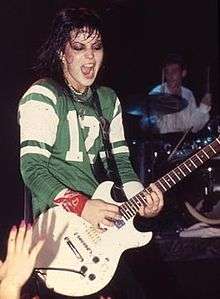
_(29235540794).jpg)
